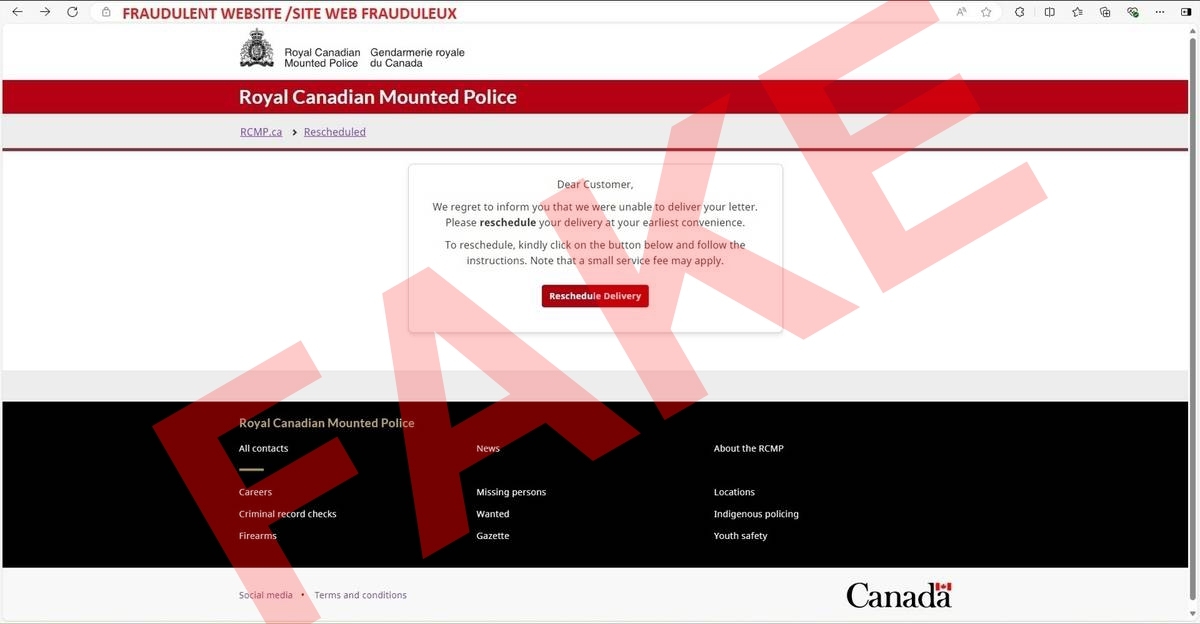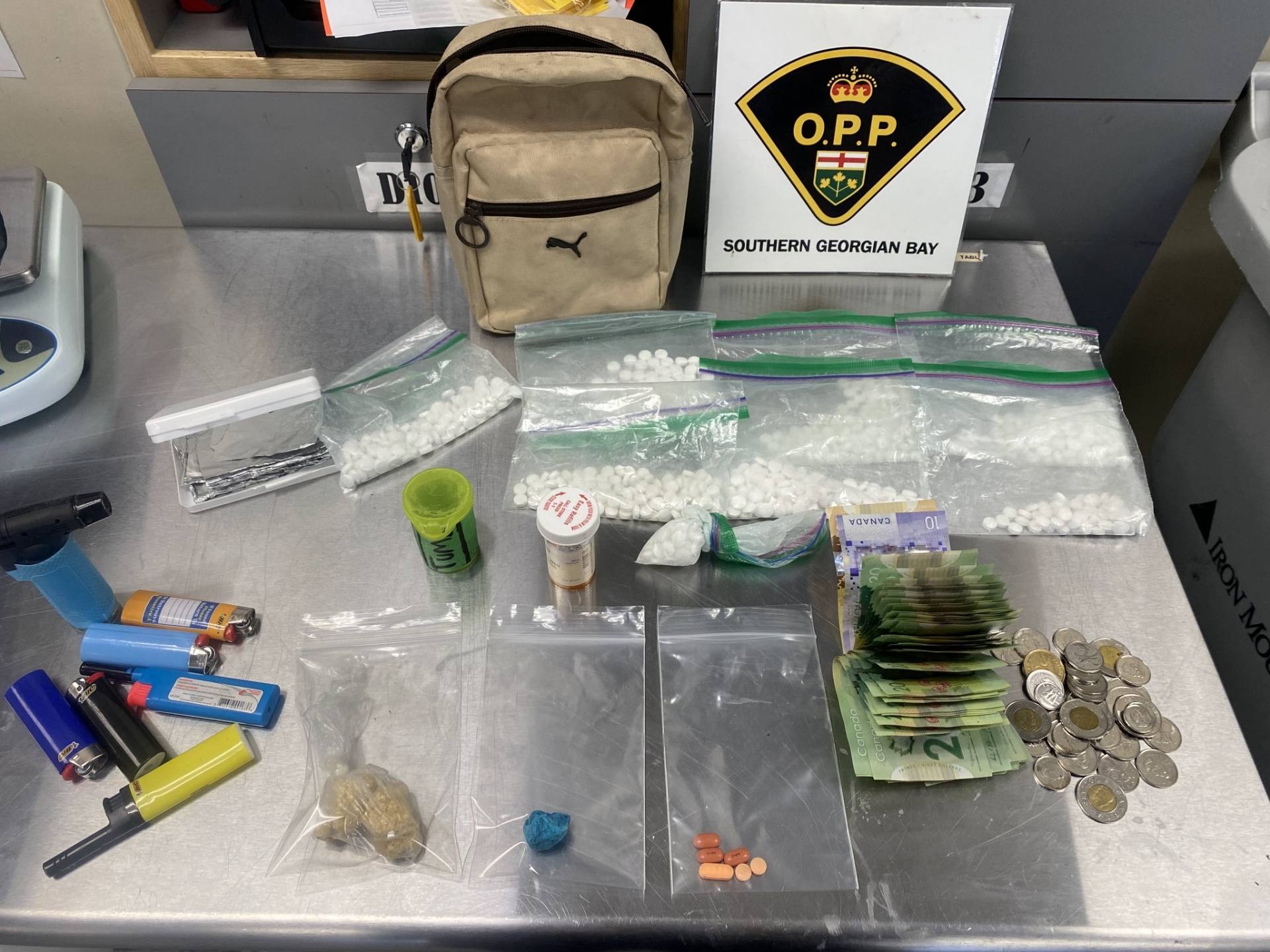Southern Georgian Bay O.P.P.
in Midland
On January 30
at 4:25 PM
FROM/DE: Anti-Rackets Branch DATE: January 30, 2025
WARNING: FRAUDULENT CALLS IMPERSONATING OPP, RCMP AND CANADIAN ANTI-FRAUD CENTRE
(OTTAWA, ON) - The Ontario Provincial Police (OPP) is warning the public about individuals using the OPP's non-emergency telephone number to legitimize fraudulent bank investigator scams, where victims are misled into believing they must help catch a dishonest bank employee or resolve suspicious transactions by providing personal information or transferring funds.
The Royal Canadian Mounted Police (RCMP) and the Canadian Anti-Fraud Centre (CAFC) are also warning about ongoing phishing schemes where those behind the scams claim to represent the RCMP.
The OPP has seen an increase in the spoofing of business, government and law enforcement telephone numbers, email addresses and websites.
How the schemes work
Individuals engaged in these fraudulent activities often impersonate financial institutions, claiming that unauthorized transactions have occurred on your account or that your account has been compromised. They pressure victims to provide personal information, transfer funds or assist in a fake investigation.
To appear credible, those behind the schemes may:
· spoof phone numbers and emails to appear legitimate
· send emails with fake logos or fraudulent contact information
How to protect yourself
Do not trust caller ID. Those behind the scam can spoof legitimate numbers to deceive you. If you receive a suspicious call, hang up and verify the claims by contacting your bank or the organization directly. Use a trusted number, such as the one on the back of your debit or credit card. Avoid clicking on links in unsolicited messages and never share authentication codes. Do not allow anyone remote access to your computer under any circumstances. Legitimate organizations will never:
· request you to transfer funds for "security" reasons
· ask for your bank card or visit your home to collect it
Important reminders from the OPP
· The OPP's non-emergency number is for incoming calls only.
· The OPP will never contact the public to demand cryptocurrency or funds in connection with money laundering or major criminal investigations.
· The toll-free OPP number 1-888-310-1122 is available 24/7 for non-emergency calls in Ontario.
· This number also serves as a TTY (teletypewriter) service for the hearing impaired and is accessible 24/7 for both emergency and non-emergency calls.
Reporting fraud
If you suspect fraud, contact:
· Your local police
· OPP at 1-888-310-1122
· Crime Stoppers anonymously at 1-800-222-TIPS (8477) or ontariocrimestoppers.ca
· Canadian Anti-Fraud Centre via the online reporting system or by phone at 1-888-495-8501
For more fraud prevention resources, visit: antifraudcentre-centreantifraude.ca
Media availability
An OPP expert is available for interviews to provide further insight into this issue.
-30-
Contact Information
John Armit
Constable Detective
Anti-Rackets Branch (ARB)
Ontario Provincial Police
John.armit@opp.ca
CAFC X and Facebook
OPP X, Facebook, and Instagram

Southern Georgian Bay O.P.P.
in Midland
On January 28
at 6:54 PM
OPP AND CAFC PARTNER TO RAISE AWARENESS OF A PHISHING SCAM IMPERSONATING THE RCMP
(MIDLAND,ON)- Members of the Southern Georgian Bay Detachment of the Ontario Provincial Police (OPP) and the Canadian Anti-Fraud Centre (CAFC) are continuing to raise the awareness for North Simcoe residents of the various scams that they may encounter on the telephone or online.
The Royal Canadian Mounted Police (RCMP) and the Canadian Anti-Fraud Centre (CAFC) are warning the public about an ongoing phishing scam impersonating the RCMP.
Unsolicited RCMP "delivery notices" are sent via text messages. The messages inform recipients that the RCMP was unable to deliver court documents and ask to reschedule to avoid missing a court date. These messages contain a link to an unofficial and fraudulent RCMP website to "reschedule the delivery".
This is a scam! The RCMP does not issue notices by text messages and the official RCMP home page is: https://www.rcmp-grc.gc.ca/
If you receive such a message, do not click the links - delete the text immediately. If you clicked on a link or provided personal details via the fraudulent website, contact your financial institution immediately and report it to your local police service and the CAFC.
For the full news release and examples of the phishing text message please click on the following link. Warning: Phishing scam impersonating the RCMP | Royal Canadian Mounted Police
No matter your level of cyber fitness, fraudsters will stop at nothing to steal from their victims. Your best protection against cyber threats is to learn more about them and the simple steps you can take to protect yourself.
To learn more about common tactics used by cyber criminals, explore the Fraudster's toolbox infographic
Anyone who suspects they have been the victim of cybercrime or fraud should report it to their local police and to the Canadian Anti-Fraud Centre's online reporting system or by phone at 1-888-495-8501. If not a victim, report it to the CAFC anyway.
CAFC Team
partners@antifraudcentre.ca
Fraud: Recognize. Reject. Report.
#kNOwFraud
Follow us on Twitter (@canantifraud) and Facebook (Canadian Anti-Fraud Centre)
Southern Georgian Bay O.P.P.
in Midland
On January 27
at 6:28 PM
Electric or not, this vehicle stop by #SGBOPP on Vasey Road Tay Township resulted in a number of charges for the male operator, such as no insurance, no permit, Driving while prohibited under the criminal code. So in the end, the little vehicle was loaded up on the big tow truck. If your thinking of heading out on the road or buying one of these little vehicles , just might want to dive into the following link for up to date legal requirements.
https://www.ontario.ca/laws/regulation/170215

Southern Georgian Bay O.P.P.
in Midland
On January 27
at 5:19 PM
OPP Snowmobile Patrol Out on the Trails over the Weekend to Help Keep Riders Safe and More DYK Information
Riders on the local Ontario Federation of Snowmobile Clubs (OFSC) trails may have noticed the presence of the OPP Central Region snowmobile patrol making the rounds during the weekend January 25-26, 2025 helping to keep the trails safe for all riders.
Officers on sleds logged over 24 hours of patrol checking over 125 snowmobilers for equipment, required licences, registration and trail passes where applicable. Officers also conducted two separate reduce impaired driving everywhere (R.I.D.E.) programs checking over 40 snowmobilers for signs of impairment in an effort to maintain trail safety.
With a balance between rider education and enforcement in mind, officers deal with issues found on the trails on a daily basis under some extreme weather conditions and welcome your cooperation on the many trails here in North Simcoe.
Seventy three riders were warned for a variety of Motorized Snow Vehicle Act (MSVA) offences which were predominantly failing to have a valid ownership permit on their snowmobile.
Twenty five riders were charged with MSVA offences mostly for operating sleds with modified or improper exhaust systems
two crashes were reported or investigated during this time frame with one investigation resulting in a number of MSVA tickets in including Careless Operation for a driver under the age of 16 years.
officers note a proven fact that wearing a properly fastened helmet can help prevent serious injury or worse should you crash!
Another Did You Know (DYK) question asked almost daily since the start of the 2024-2025 snowmobile season is "can I get a ticket for cutting/modifying or changing out my exhaust system ultimately making the sled engine much louder than the stock system?
Short answer is YES, and upon conviction will cost you $110.00
A look into the Motorized Snow Vehicle Act https://www.ontario.ca/laws/statute/90m44 reveals the following legislation.
Equipment requirements
Muffler in working order
18 (1) No person shall drive a motorized snow vehicle unless it is equipped with a muffler in good working order and in constant operation and no person shall drive a motorized snow vehicle which has a muffler cut-out, straight exhaust, gutted muffler, hollywood muffler, by-pass or similar device upon the motorized snow vehicle. R.S.O. 1990, c. M.44, s. 18 (1).
Removing or modifying any component
(2) No person shall drive or permit to be driven any motorized snow vehicle upon which any component or device, which was required under the provisions of the Motor Vehicle Safety Act (Canada) at the time that the motorized snow vehicle was manufactured or imported into Canada, has been removed, modified or rendered inoperative. R.S.O. 1990, c. M.44, s. 18 (2).
Exception in racing area
(3) Subsections (1) and (2) do not apply to a motorized snow vehicle while it is driven in a racing area sanctioned as such by the council of the municipality within which the racing area is located. R.S.O. 1990, c. M.44, s. 18 (3); 2002, c. 17, Sched. F, Table.
If you need to renew your snow vehicle registration you can visit a Service Ontario centre in person or visit the following site online https://cxp.mgcs.gov.on.ca/cxp-web/licence-plate-renewal/information.
Snowmobiling is a wonderful sport for most family members to enjoy the great outdoors, but sadly we have to attend incidents involving snowmobiles being operated by persons who are suspected of being impaired, or operating carelessly and are tasked with an investigation that will have long lasting effects on all involved, victims and emergency services personnel.
Ride in control and to the trail conditions
Obey the posted speed limit.
Never, ever drive impaired
No Ice is Safe Ice
Snowmobilers planning to head out on the OFSC trail system this weekend would be well advised to check on the following website link to ensure the trail is open for use - Snowmobiling Ontario
It also goes without saying that it is still early in the cold weather winter season for local ice conditions to be up to expectations for ice surface travel by foot or by machine. Always remember that, "No Ice Is Safe Ice" and to check the ice surface or inquire with local residents, ice hut operators, weather stations or any other reliable source before heading out and possibly going through into the frigid waters below. Ultimately, you may be risking your life, the lives of others possibly with you and that of emergency service responders tasked to rescue you, or worse to locate and remove you from the lake.
All drivers /riders/operators should be aware that the O.P.P. R.I.D.E. program checks are conducted 24/7 all year long. The OPP remains committed to taking alcohol/drug-impaired drivers off our roads & trails through enforcement and public education so riders can expect to see OPP officers on the trail system during day time & night time hours. Also, it can be expected that uniform road patrol officers will be conducting Reduce Impaired Driving Everywhere (R.I.D.E.) programs at trail heads. The Detachment also works with area safety partners such as MADD Canada, Arrive Alive, The North Simcoe Safe and Sober Awareness Committee and area snowmobile clubs, Georgian Bay Snow Riders (GBSR) and the Baxter Snow Riders (BSR) and the Ontario Federation of Snowmobile Clubs (OFSC).
The sport of snowmobiling has many associated inherent risks, dangers and hazards caused by the changing terrain & environment, your machine, and others on their machines to name a few. To help reduce these risks, riders are reminded to always check the Interactive Trail Guide before heading on the trails and wear all of the required safety equipment including floater suits if travelling on frozen water surfaces. It is highly recommended to have a fully charged cell phone with you, let a family member know where your heading to and a return time, load a location app on your cell phone such as What3Words and/or the Interactive Trail Guide and remember that "No Ice Is Safe Ice" . Self rescue maybe your only way out for reasons depicted in the following link - https://twitter.com/OPP_News/status/1342817627077488641

Southern Georgian Bay O.P.P.
in Midland
On January 24
at 11:02 PM
Observant OPP Officer Nabs Wanted Person Leading to Drug Seizure in Midland
(MIDLAND, ON) - An observant officer from the Southern Georgian Bay Detachment of the Ontario Provincial Police (OPP) while on patrol in downtown Midland, arrested a wanted individual which led to a further drug investigation.
Near 10:39 a.m. January 24, 2025, the officer noticed a northbound King Street cab had a passenger onboard known to be wanted on a detachment held judicial process and proceeded to conduct a traffic stop. The individual was arrested and during this arrest a further investigation was commenced with a quantity of drugs being located including a significant quantity of suspected blue fentanyl, gold fentanyl and oxycodone along with Canadian cash and drug paraphernalia was seized.(See attached submitted OPP photograph)
Charged in connection to this investigation is a 49 year old male of Elmvale with the following offences.
Possession of a Schedule I Substance - Opioid (other than heroin)
Possession of a Schedule I Substance- Other Drugs
Possession of a Schedule I substance for the purpose of Trafficking-Opioid (other than heroin) (two counts)
Contrary to the Controlled Drug and Substances Act
Possession of proceeds of property obtained by crime under $5000 - in Canada
Fail to Comply with Probation Order
Contrary to the Criminal Code of Canada
The accused was released from custody to appear before the Ontario Court of Justice at a future date.
Anyone having knowledge of drug or property related investigations is asked to contact the OPP at 1-888-310-1122, opp.southern.georgian.bay@opp.ca or by calling Crime Stoppers at 1-800-222-TIPS (8477).You can submit your information online at https://www.crimestopperssdm.com/ Crime Stoppers does not subscribe to call display and you will remain anonymous. Being anonymous, you will not testify in court and your information may lead to a cash reward of up to $2,000.00.
Incident # E250095785

Page 8 of 20


